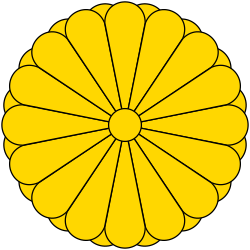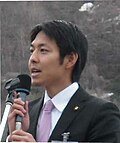| This article is part of a series on |
 |
|---|
The governor is the highest ranking executive of a prefecture in Japan.
Contents
| Prefecture | Picture | Current governor | Former party | Term | Took office | Office expires | |
|---|---|---|---|---|---|---|---|
 Aichi (list) |  | Hideaki Omura | Independent [a] | 4th [1] | February 15, 2011 | February 11, 2027 | |
 Akita (list) |  | Kenta Suzuki | Independent | 1st | April 20, 2025 | April 19, 2029 | |
 Aomori (list) |  | Sōichirō Miyashita | Independent | 1st | June 29 , 2023 | June 28, 2027 | |
 Chiba |  | Toshihito Kumagai | Independent [b] [2] | 2nd | April 5, 2021 | April 4, 2029 | |
 Ehime |  | Tokihiro Nakamura | Independent [c] | 4th [3] | December 1, 2010 | November 29, 2026 | |
 Fukui | Takato Ishida | Independent | 1st | January 28, 2026 | January 24, 2030 | ||
 Fukuoka |  | Seitaro Hattori | Independent [d] [4] | 2nd | April 14, 2021 | April 10, 2029 | |
 Fukushima |  | Masao Uchibori | Independent [e] | 3rd [5] | November 12, 2014 | November 10, 2026 | |
 Gifu |  | Yoshihide Esaki | Independent [f] | 1st | February 6, 2025 | February 5, 2029 | |
 Gunma |  | Ichita Yamamoto | Independent [g] | 2nd | July 28, 2019 | July 27, 2027 | |
 Hiroshima (list) | Mika Yokota | Independent | 1st [6] | November 29, 2025 | November 28, 2029 | ||
 Hokkaidō (list) |  | Naomichi Suzuki | Independent [g] [7] | 2nd [8] | April 23, 2019 [9] | April 21, 2027 | |
 Hyōgo |  | Motohiko Saitō | Independent [h] [10] | 2nd | August 1, 2021 | November 16, 2028 | |
 Ibaraki (list) |  | Kazuhiko Ōigawa | Independent [g] | 3rd | September 26, 2017 | September 25, 2029 | |
 Ishikawa (list) |  | Hiroshi Hase | LDP [h] [11] | 1st | March 27, 2022 | March 26, 2026 | |
 Iwate |  | Takuya Tasso | Independent [i] | 4th | April 30, 2007 | September 10, 2027 | |
 Kagawa |  | Toyohito Ikeda | Independent [f] [12] | 1st | September 5, 2022 | September 4, 2026 | |
 Kagoshima |  | Kōichi Shiota | Independent [j] [13] | 2nd | July 28, 2020 | July 27, 2028 | |
 Kanagawa (list) |  | Yūji Kuroiwa | Independent [c] | 4th [8] | April 23, 2011 | April 19, 2027 | |
 Kōchi |  | Seiji Hamada | Independent [g] [14] | 2nd | December 7, 2019 [15] | December 6, 2027 | |
 Kumamoto (list) |  | Takashi Kimura | Independent [g] [16] | 1st | April 16, 2024 | April 15, 2028 | |
 Kyoto (list) |  | Takatoshi Nishiwaki | Independent [k] | 2nd | April 16, 2018 [17] [18] | April 15, 2026 | |
 Mie |  | Katsuyuki Ichimi | Independent [f] [19] | 2nd | September 14, 2021 | September 11, 2029 | |
 Miyagi (list) |  | Yoshihiro Murai | LDP [l] | 6th | November 21, 2005 | November 20, 2029 | |
 Miyazaki |  | Shunji Kōno | Independent [c] | 4th [20] | January 21, 2011 | January 17, 2027 | |
 Nagano (list) |  | Shuichi Abe | Independent [m] | 4th | September 1, 2010 | August 30, 2026 | |
 Nagasaki |  | Kengo Oishi | Independent [n] [21] | 1st | March 2, 2022 | March 1, 2026 | |
 Nara |  | Makoto Yamashita | JIP [8] | 1st [8] | May 2, 2023 | May 1, 2027 | |
 Niigata (list) |  | Hideyo Hanazumi | Independent [g] [22] | 2nd [23] | June 10, 2018 [24] | June 8, 2026 | |
 Ōita |  | Kiichiro Satō | Independent [l] [8] | 1st [8] | April 28, 2023 | April 27, 2027 | |
 Okayama (list) |  | Ryūta Ibaragi | Independent [o] | 4th | November 12, 2012 | November 11, 2028 | |
 Okinawa (list) |  | Denny Tamaki | Independent [p] | 2nd [25] | October 4, 2018 [26] [27] | September 29, 2026 | |
 Ōsaka (list) |  | Hirofumi Yoshimura | JIP | 2nd [8] | April 4, 2019 [28] [29] | April 2, 2027 | |
 Saga (list) |  | Yoshinori Yamaguchi | Independent [j] | 3rd [30] | January 14, 2015 | January 9, 2027 | |
 Saitama (list) |  | Motohiro Ōno | DPP [q] | 2nd | August 31, 2019 [31] [32] | August 30, 2027 | |
 Shiga (list) |  | Taizō Mikazuki | Independent [i] | 3rd | July 20, 2014 | July 18, 2026 | |
 Shimane |  | Tatsuya Maruyama | Independent | 2nd [8] | April 30, 2019 | April 28, 2027 | |
 Shizuoka |  | Yasutomo Suzuki | Independent [r] | 1st | May 26, 2024 | May 25, 2028 | |
 Tochigi |  | Tomikazu Fukuda | Independent [g] | 6th | December 9, 2004 | December 8, 2028 | |
 Tokushima |  | Masazumi Gotoda | LDP | 1st | May 18, 2023 | May 17, 2027 | |
 Tokyo (list) |  | Yuriko Koike | Independent | 3rd | August 2, 2016 [33] | July 30, 2028 | |
 Tottori |  | Shinji Hirai | Independent [g] | 5th [8] | April 13, 2007 | April 8, 2027 | |
 Toyama |  | Hachiro Nitta | Independent [n] | 2nd | November 9, 2020 | November 8, 2028 | |
 Wakayama |  | Izumi Miyazaki | Independent | 1st | June 3, 2025 | May 31, 2029 | |
 Yamagata |  | Mieko Yoshimura | Independent [s] | 5th | February 14, 2009 | February 13, 2029 | |
 Yamaguchi |  | Tsugumasa Muraoka | Independent [g] | 3rd | February 25, 2014 | February 22, 2026 | |
 Yamanashi |  | Kotaro Nagasaki | LDP [g] [34] | 2nd [35] | February 17, 2019 | February 16, 2027 | |